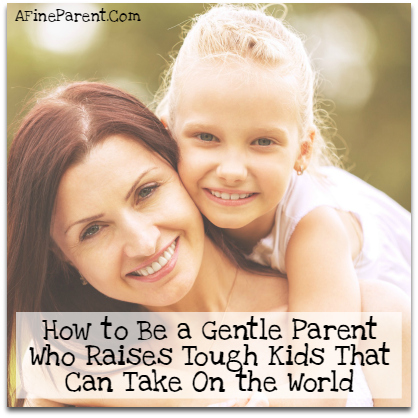 What do you do when your child wants to quit?
What do you do when your child wants to quit?
Imagine that your 9-year-old daughter greets you with a look of dread when you pick her up from swim practice. Her coach wants her to swim the 100-meter breaststroke in the upcoming meet.
In tears, she says, “Please, Mom. Please help me. I’m still going to be swimming when the other girls are getting out of the pool and the next heat is getting on the blocks. I’m really that slow.”
How can you provide emotional support while still encouraging her to not give up too easily? How do you even know whether she’s up for such a challenge?
Can you let go of control and trust her to make a good decision?
This is the real-life dilemma Brené Brown faced in her book Daring Greatly.
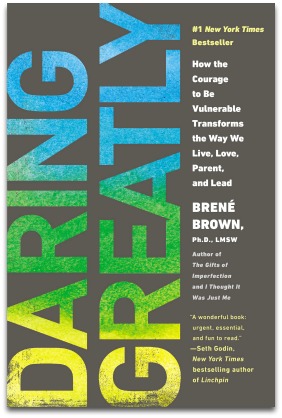 Her heart ached for her daughter. She desperately wanted to spare her the possible humiliation. She also wanted her daughter to learn that her worthiness does not depend on winning or losing, and that both her parents would stand by her, no matter what. She came up with one of the most compassionate, courageous solutions I could have imagined.
Her heart ached for her daughter. She desperately wanted to spare her the possible humiliation. She also wanted her daughter to learn that her worthiness does not depend on winning or losing, and that both her parents would stand by her, no matter what. She came up with one of the most compassionate, courageous solutions I could have imagined.
She told her daughter that if the coach wanted her in the race, she’d have to do it, then she listened, really listened with an open heart.
Her daughter put her head down and sobbed. She even told her mother that she could scratch the event (not show up for that race). Rather than scold her or try to convince her, Brené empathized. “You can scratch that event. I’d probably consider that option too. But what if your goal for that race isn’t to win or even to get out of the water at the same time as the other girls? What if your goal is to show up and get wet?”
The Power of Unconditional Love
Do you love your kids unconditionally?
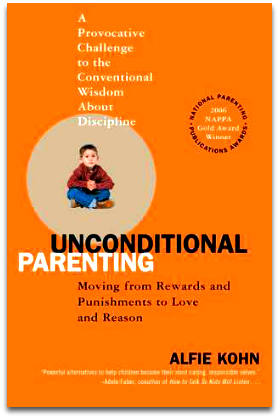 Alfie Kohn in a New York Times article says,
Alfie Kohn in a New York Times article says,
“Most of us would protest that of course we love our children without any strings attached. But what counts is how things look from the perspective of the children – whether they feel just as loved when they mess up or fall short.”
Our children need our unconditional love and acceptance. But so often, parenting advice is to ignore, criticize, label, or punish behavior that we find unacceptable. Or to bribe, praise, or reward our kids in order to get them to do what we want.
We are steeped in a culture that believes that kids can only learn right from wrong if they are punished for their mistakes and rewarded for their accomplishments.
Even if we do these things out of love or concern for their well-being (and I know from my own experience that we often are actually acting out of fear, anger, or the desire to control), our kids can feel as if they are loved only when they do what we want.
I want something better for my daughter. I want her to know, to really feel that she is loved exactly as she is. I strive for this unconditional, no-strings-attached love. I fail at it all the time. But I come back, and keep reaching for connection each time.
Gentle Parenting: Feeling Loved and Growing up Strong
And it turns out, this same experience of being unconditionally loved plays a key role in helping kids develop traits such as empathy, resilience, grit, and responsibility.
Carl Rogers, who pioneered the client-centered approach to psychology writes, “We cannot change, we cannot move away from what we are, until we thoroughly accept what we are.”
As parents, we can accept where our kids are, then help them move to the next stage.
How can we do this without controlling our kids through punishments and rewards?
- Provide clear expectations: Children need parents to keep them safe, to help the household run efficiently, and to teach them behavior that is appropriate for their society. We can set clear expectations without labeling, demeaning, shaming, or threatening them. For example: “Hands are not for hitting.” “I don’t like being pushed.” “Dirty dishes go in the sink.”
- Listen empathetically: Sometimes our kids get overwhelmed with negative feelings. They may be mad because they are not ready to leave the park, for example. In this case, what they need most is not someone telling them they need to stop crying. Crying is their very legitimate way of both expressing hurt and healing from it. Read Dr Laura Markam’s great example of how to empathetically stick with a limit your child does not happily accept.
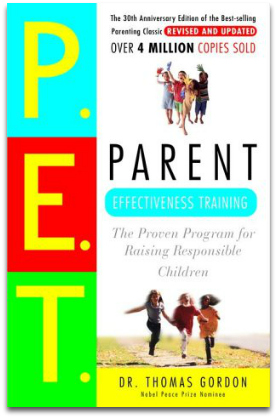 Find win-win solutions: In Parent Effectiveness Training, Thomas Gordon breaks down parent-child conflicts into three types: win-lose (parent gets his/her way and child feels angry, misunderstood, insecure, or disempowered), lose-win (child gets his/her way and parent often ends up feeling resentful, angry, confused, or out of control), or win-win (parent and child both agree on a solution; both are content with the outcome). When both “sides” know that their needs will be met and that they won’t be forced to do something they really don’t want to, everyone is freer to look for creative, cooperative solutions.
Find win-win solutions: In Parent Effectiveness Training, Thomas Gordon breaks down parent-child conflicts into three types: win-lose (parent gets his/her way and child feels angry, misunderstood, insecure, or disempowered), lose-win (child gets his/her way and parent often ends up feeling resentful, angry, confused, or out of control), or win-win (parent and child both agree on a solution; both are content with the outcome). When both “sides” know that their needs will be met and that they won’t be forced to do something they really don’t want to, everyone is freer to look for creative, cooperative solutions.
Life in the Real World
“Well, that sounds great, but how does it work in the real world?” you may be thinking. Or like many parents I have worked with, you may be worried that gentle parenting might handicap your kids when they are out there in the Big Bad World.
The good news is that more and more research is coming in, and it all points to a parenting style that is involved, responsive, respects kids’ autonomy, and holds appropriate expectations on behavior. Brené modeled this perfectly in how she handled her daughter’s swim meet anxiety; she didn’t shame, coerce, or pressure her daughter, she respected her daughter’s feelings and empathized with her, and she reiterated her family’s values of showing up even when you’re scared.
Here are just a few of the ways that this type of gentle parenting helps kids develop the strength they need to take on the world.
When the Going Gets Tough
A single characteristic predicts the likelihood of graduating from high school, staying in a sales job, completing a college degree, surviving West Point’s hellish “Beast Barracks” freshman orientation, and flying through the Green Beret’s Special Forces Selection course.
Grit. The powerful combination of passion and perseverance that allows people to power through obstacles and setbacks to achieve their goals.
So, what can a parent do to foster grit?
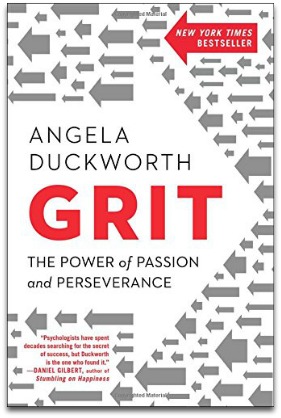 In her book Grit, Angela Duckworth explains that to raise kids who have grit, parents need to be warm and respectful of their kids, and also hold high expectations for them. But it’s crucial that kids feel the support and believe that their parents think they can achieve the expectations. (And we’re right back to Alfie Kohn).
In her book Grit, Angela Duckworth explains that to raise kids who have grit, parents need to be warm and respectful of their kids, and also hold high expectations for them. But it’s crucial that kids feel the support and believe that their parents think they can achieve the expectations. (And we’re right back to Alfie Kohn).
Secondly, parents need to model grit themselves. Do you have long-term goals? Do you pursue them with passion and perseverance? Do you talk about the process, both your successes and setbacks with your kids? If you answered yes, then you are increasing the odds that your child will also develop grit.
Thirdly, kids need practice doing difficult things. Angela’s family plays by the Hard Thing Rule: each person picks something that requires daily, deliberate practice and commits to it until there is a natural stopping point (the end of the course or season, reaching a certain goal, etc.) This takes care of the “high expectations” part.
To get the “warm and respectful” part, everybody gets to choose their own Hard Thing. When kids want to quit, their parents empathize with them, let them take responsibility for how they want to approach the goal, and cheer them on, whether they succeed or fail.
Brené took this a step further by allowing her daughter to decide for herself whether it was worth “staying in the game.”
Building Character
How do we help our kids develop good character traits such as empathy, honesty, responsibility, and patience?
I have a friend who tells me of how she would walk around the house and clean up messes that her husband had left behind. Frustrated, she would sigh “Oh Peter!”
One day, her toddler dropped her stuffed bunny behind the sofa. “Oh Peter!” she cried. With horror, she realized that her toddler thought “Oh Peter” was an expletive.
Like my friend, we’ve all experienced how children are hardwired to mimic the people around them, and especially their parents, siblings, and other caretakers. Therefore, one of the most important character lessons to give our kids is us behaving in the same way we want them to.
This modeling is one of the 5 parental characteristics that are important for developing kids’ moral behavior, as described by Dr. Marvin W. Berkowitz, professor of Character Education and Co-Director of the Center for Character and Citizenship at the University of Missouri-St. Louis.
- Modeling: acting in the way you want your kids to act. If you want kids to be respectful, be respectful to them and to other people. It also extends to how you talk about events in your own life.
- Induction: explaining why we act in a certain way/have certain rules. Instead of just saying, “No throwing balls in the house,” we explain, “We don’t throw the ball in the house because there are too many fragile things that might break if the ball hits them.”
- Nurture and support: showing empathy for a child’s feelings and taking their desires into account. These lead to the child developing a sense of their own worth, and by extension, the worth of other people
- High, but realistic expectations: knowing what a child is capable of, and providing enough support, guidance, or instruction for them to get to the next level
- Democratic decision-making and discussion: allowing kids an equal voice in decision-making helps them take other people’s needs into account, reason about what is fair, and practice conflict resolution. As a bonus, kids (and adults, too!) are more likely to comply with decisions that they have had a hand in shaping.
Teaching Responsibility
Do your kids do chores? Do you use a reward system to motivate them? Or do you withdraw privileges or dock their allowance if they don’t perform?
Here are just a few of the effects of punishing kids:
- Increased lying
- Less in control of their emotions (so more likely to misbehave)
- Decreased empathy toward other people
- Less likely to respect parents and accept their influence
And rewards are not any better. They diminish our internal motivation for tasks we already enjoy and make us feel manipulated.
Is there a better way?
 In Parent Effectiveness Training (one of my all-time favorite parenting books), Thomas Gordon outlines his No-Lose Method for resolving conflicts about things like chores, curfews, and allowances. This method eliminates power struggles, develops kids’ thinking skills, requires less enforcement from parents, and helps kids practice being responsible. The key is to find a solution that is acceptable to both of you.
In Parent Effectiveness Training (one of my all-time favorite parenting books), Thomas Gordon outlines his No-Lose Method for resolving conflicts about things like chores, curfews, and allowances. This method eliminates power struggles, develops kids’ thinking skills, requires less enforcement from parents, and helps kids practice being responsible. The key is to find a solution that is acceptable to both of you.
- Identify the problem: including any concerns that either you or your child have.
- Generate possible solutions: Come up with as many solutions as possible. Don’t criticize or judge any of them just yet. Just collect as many as possible (writing them down is definitely recommended!)
- Evaluate the possible solutions: Eliminate any that don’t work for you or your child. Which one seems to be the best? Can we combine any of the solutions? Resist the temptation to steer your child to “your” solution.
- Decide on the best solution: Make sure that the solution is one that you BOTH can live with. No one should feel bad about the decision, or as if they are being forced into something they really don’t want to do.
- Implement the solution: This is the time to nail down all the details. Who will do what? When does it need to be finished? What’s our quality benchmark? Do we need to do anything else before we can implement the solution?
- Evaluate how it worked: Did you reach your desired result? Are you and your child BOTH still happy with the solution? Does anything need to be tweaked?
(Here’s a theoretical example and a personal example of the No-Lose Method in action)
Kids who grow up with this type of conflict resolution get the opportunity to make decisions and see the effects of those decisions on themselves and other people. They learn to make good choices not because they have been forced to, but because they develop their own inner standards.
How would Brené’s daughter have reacted had Brené forbidden her to scratch the event? She might have gone through with it, but she would have resented her mom and her coach. Or she might have scratched anyway, maybe to avoid the humiliation, or maybe even just to prove that she could.
Instead, she was free to make the choice herself. And she chose to show up.
It was no Hollywood-underdog-success-story. She finished last, getting out of the water well after the other girls did. She learned that her parents were there for her. And she learned something about herself. “That was pretty bad, but I did it. I showed up and I got wet. I was brave.”
There’s a girl who can take on the world!
The 2-Minute Action Plan for Fine Parents
For our quick-action today, here are a few contemplation questions:
- Think back on a time when your parents used punishments or rewards to get you to act a certain way. How did you feel about it?
- Which trait — grit, character or responsibility — seems hardest to accomplish with gentle parenting? What are some of the other traits that you struggle to teach using gentle parenting?
- As a gentle parent, how do you handle other people’s criticism that your kids are not going to be able to face the real world?
- What was your gut reaction to Brené’s essentially giving her daughter permission to bow out of a difficult event? Where do you find it difficult to let go of control and trust your kids to make a good decision?
The Ongoing Action Plan for Fine Parents
This one’s all about modeling.
Commit to gentle parenting as your one Hard Thing to try. Set a daily goal and decide on a minimum commitment period. Share your commitment with your family. When it gets hard, let your kids see your struggle. Share your mini-successes and setbacks with them. Work with them to figure out solutions through tough times.
It’s not going to be easy, but I guarantee you, it will be well worth it!


Leave a Reply